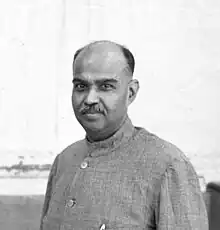Syama Prasad Mukherjee
Syama Prasad Mukherjee (6 July 1901 – 23 June 1953) was India's first Minister for Supply and Industry. His father was a judge and an academic, and Mukherjee followed in his footsteps. He earned a B.A. (Hons) in English, an M.A. in Bengali, and a B.L., all from Calcutta University. In 1926, he was called to the English Bar, and became a qualified barrister. Upon returning to India, he entered politics. In 1929, he was elected to the Bengal state legislature as a member of the Congress; however, he resigned from the party a year later due to ideological clashes with the leadership. Mukherjee continued to pursue his academic career alongside his political interests, and became the youngest Vice-Chancellor of Calcutta University in 1934, at the age of 33.In 1937, Mukherjee became Leader of the Opposition in Bengal after winning elections as an independent candidate. He later became the President of the All-India Hindu Mahasabha, and used his political influence to form a coalition government with the Krishak Praja Party, under which he was appointed Finance Minister of the state.

Independence and after independence
Mukherjee resigned from his post in the Bengal coalition government in 1942, after writing to the Governor of the province demanding self-rule for Indians. Subsequently, he took on an important role in the humanitarian efforts surrounding the Bengal famine. He later emerged as one of the Muslim League’s foremost opponents, and made several passionate speeches against the project of Partition and in support of a unified India. Mukherjee was elected to the Constituent Assembly from West Bengal on a Congress Party ticket. He intervened in several debates, including those on minorities, regional languages, and the effect of the Muslim League's absence from the Assembly.
Post-independence, Mukherjee became a prominent member of the Opposition. In 1951, he founded the Bharatiya Jana Sangh, which won three seats in the following year’s parliamentary election—the first of its kind in Independent India. The party’s goals included economic liberalism and decentralisation, equality of all, Hindi as the national language, and the reunification of India. During his time in Parliament, Mukherjee was a strong opponent of Article 370. He launched a hunger strike in protest against the Union Government’s policies in the state of Jammu and Kashmir.In 1953, he attempted to illegally visit the state, resulting in his arrest at the border. Mukherjee died of a heart attack on 23rd June 1953, while in custody of the Jammu & Kashmir police in Srinagar.